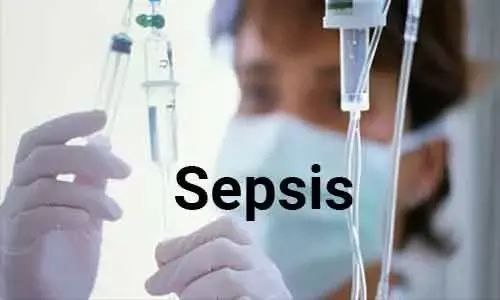- Home
- Medical news & Guidelines
- Anesthesiology
- Cardiology and CTVS
- Critical Care
- Dentistry
- Dermatology
- Diabetes and Endocrinology
- ENT
- Gastroenterology
- Medicine
- Nephrology
- Neurology
- Obstretics-Gynaecology
- Oncology
- Ophthalmology
- Orthopaedics
- Pediatrics-Neonatology
- Psychiatry
- Pulmonology
- Radiology
- Surgery
- Urology
- Laboratory Medicine
- Diet
- Nursing
- Paramedical
- Physiotherapy
- Health news
- Fact Check
- Bone Health Fact Check
- Brain Health Fact Check
- Cancer Related Fact Check
- Child Care Fact Check
- Dental and oral health fact check
- Diabetes and metabolic health fact check
- Diet and Nutrition Fact Check
- Eye and ENT Care Fact Check
- Fitness fact check
- Gut health fact check
- Heart health fact check
- Kidney health fact check
- Medical education fact check
- Men's health fact check
- Respiratory fact check
- Skin and hair care fact check
- Vaccine and Immunization fact check
- Women's health fact check
- AYUSH
- State News
- Andaman and Nicobar Islands
- Andhra Pradesh
- Arunachal Pradesh
- Assam
- Bihar
- Chandigarh
- Chattisgarh
- Dadra and Nagar Haveli
- Daman and Diu
- Delhi
- Goa
- Gujarat
- Haryana
- Himachal Pradesh
- Jammu & Kashmir
- Jharkhand
- Karnataka
- Kerala
- Ladakh
- Lakshadweep
- Madhya Pradesh
- Maharashtra
- Manipur
- Meghalaya
- Mizoram
- Nagaland
- Odisha
- Puducherry
- Punjab
- Rajasthan
- Sikkim
- Tamil Nadu
- Telangana
- Tripura
- Uttar Pradesh
- Uttrakhand
- West Bengal
- Medical Education
- Industry
Early initiation of norepinephrine may reduce mortality in Sepsis, finds study

China: Early initiation of norepinephrine in septic shock patients is associated with shorter time to achieve target MAP, decreased short-term mortality, and less volume of IV fluids within 6 h, suggests a recent study in the BMC journal Critical Care. Further, the study found no significant difference in ICU length of stay between late and early groups.
Septic shock remains one of the most challenging problem in ICUs. Mortality remains between 25 and 50% of those afflicted, with an increasing annual incidence in the developed world. Septic shock patients can be identified with a clinical construct of sepsis with persisting hypotension requiring vasopressors to maintain mean arterial pressure (MAP) ≥ 65 mmHg and having a serum lactate level > 2 mmol/L (18 mg/dL) despite adequate volume resuscitation.
Norepinephrine is both an alpha1- and beta1-agonist and is, therefore, able to increase vascular tone and contractility. Recent guidelines recommend norepinephrine as the first-line vasopressor in septic shock. The effect of the timing of norepinephrine initiation on clinical outcomes in patients with septic shock is uncertain. To fill this knowledge gap Yuting Li, The First Hospital of Jilin University, Changchun, Jilin, China, and colleagues performed a systematic review and meta-analysis to evaluate the impact of an early and late start of norepinephrine support on clinical outcomes in septic shock patients.
The researchers searched the online databases for randomized controlled trials (RCTs) and cohort studies from inception to the 1st of March 2020. Studies involving adult patients (> 18 years) with septic shock were included. A total of five studies including 929 patients were included.
All authors reported our primary outcome of short-term mortality and clearly comparing early versus late norepinephrine initiation with clinically relevant secondary outcomes (ICU length of stay, time to achieved target mean arterial pressure (≥ 65 mmHg), and volume of intravenous fluids within 6 h).
Key findings of the study include:
- The primary outcome of this meta-analysis showed that the short-term mortality of the early group was lower than that of the late group (odds ratio [OR] = 0.45).
- Secondary outcomes demonstrated that the time to achieved target MAP of the early group was shorter than that of the late group (mean difference = − 1.39).
- The volume of intravenous fluids within 6 h of the early group was less than that of the late group (mean difference = − 0.50).
- There was no statistically significant difference in the ICU length of stay between the two groups (mean difference = − 0.11).
"Early initiation of norepinephrine in patients with septic shock was associated with decreased short-term mortality, shorter time to achieved target MAP, and less volume of intravenous fluids within 6 h. There was no significant difference in ICU length of stay between early and late groups. Further large-scale RCTs are still required to confirm these results," concluded the authors.
The study, "Timing of norepinephrine initiation in patients with septic shock: a systematic review and meta-analysis," is published in the journal Critical Care.
Dr Kamal Kant Kohli-MBBS, DTCD- a chest specialist with more than 30 years of practice and a flair for writing clinical articles, Dr Kamal Kant Kohli joined Medical Dialogues as a Chief Editor of Medical News. Besides writing articles, as an editor, he proofreads and verifies all the medical content published on Medical Dialogues including those coming from journals, studies,medical conferences,guidelines etc. Email: drkohli@medicaldialogues.in. Contact no. 011-43720751


